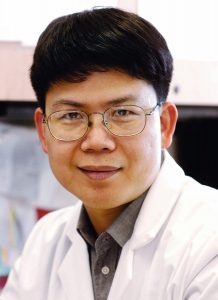Foundation for the NIH Announces Chen is Winner of 2018 Lurie Prize in Biomedical Sciences

Zhijian “James” Chen, PhD recently was awarded the 2018 Lurie Prize in Biomedical Sciences by the Foundation for the National Institutes of Health (FNIH) for his discovery of how DNA stimulates immune responses, potentially causing autoimmune diseases like lupus.
The Lurie Prize in Biomedical Sciences will be presented to Chen at the FNIH Award Ceremony, May 16 in Washington, D.C.
“We are proud to honor Dr. Chen with the 2018 Lurie Prize in Biomedical Sciences for the discovery of the cGAS enzyme and pathway and their unique role in immune and inflammatory response,” Maria C. Freire, PhD, said in a press release. Freire is president and executive director of the FNIH. “Dr. Chen joins five other Lurie Prize winners, who are shaping the future of human health through their profound biomedical research.”
Chen discovered that the enzyme cyclic GMP-AMP synthase (cGAS) and its corresponding pathway are the catalyst for the critical immune response that defends the body against viruses, bacteria, and tumors, and that, surprisingly, it also can inflict autoimmune disease.
Scientists have long known that DNA could activate the immune system to fight infections. However, the cellular process through which this activation was triggered remained unknown until Chen’s discovery.
Chen first discovered in 2012 that the cGAS enzyme could detect DNA as a danger signal to stimulate immune and inflammatory responses. Then, using complex biochemistry, he was able to demonstrate how the cGAS enzyme could actually bind itself to virus’ DNA, creating a small molecule called cyclic GMP-AMP (cGAMP) in the process, which tells the immune system to fight the virus.
The process enables the body to fight viruses like herpes or HIV, but Chen also found that if the cGAS enzyme binds itself to a person’s DNA and the pathway becomes hyperactive, it can trigger autoimmune diseases like lupus and rheumatoid arthritis.
Chen’s discovery was critical to lupus research. In fact, in October 2017, findings from a study published in the journal Nature Communications showed that inhibition of the cGAS enzyme could reduce inflammation associated with autoimmune diseases, including lupus.
In that study, researchers hypothesized that blocking the activity of cGAS could help regulate exacerbated immune responses seen in autoimmune disorders. After testing 1,268 chemical compounds that could potentially inhibit cGAS in animal models, they found four that were especially efficient while retaining pharmacological features that could be translated into the clinic. One compound, RU.521, was found to completely inhibit cGAS.
RU.521 eventually could serve as a molecular scaffold for the development of future autoimmune therapies, which confirms the importance of Chen’s discovery.
“I am so honored and humbled to join the ranks of previous Lurie Prize winners. I am very grateful to the recognition and support of Ms. Lurie, the Foundation for the NIH and the distinguished jury who selected me for this tremendous honor,” Chen said. “This honor belongs to a team of talented and dedicated scientists and students in my lab, who have worked hard to make original discoveries. The Lurie Prize is special in that it has the implicit expectation for the recipients, who are in their midcareer, to continue to make new discoveries. This is most encouraging and empowering.”
Chen is the George L. MacGregor Distinguished Chair in Biomedical Science and a member of the National Academy of Sciences. He earned a PhD from State University of New York at Buffalo and currently lectures molecular biology at the University of Texas Southwestern Medical Center.
As a recipient of the sixth Lurie Prize in Biomedical Sciences, Chen will receive a monetary honorarium of $100,000, made possible by a donation from philanthropist Ann Lurie, president of the Ann and Robert H. Lurie Foundation.







